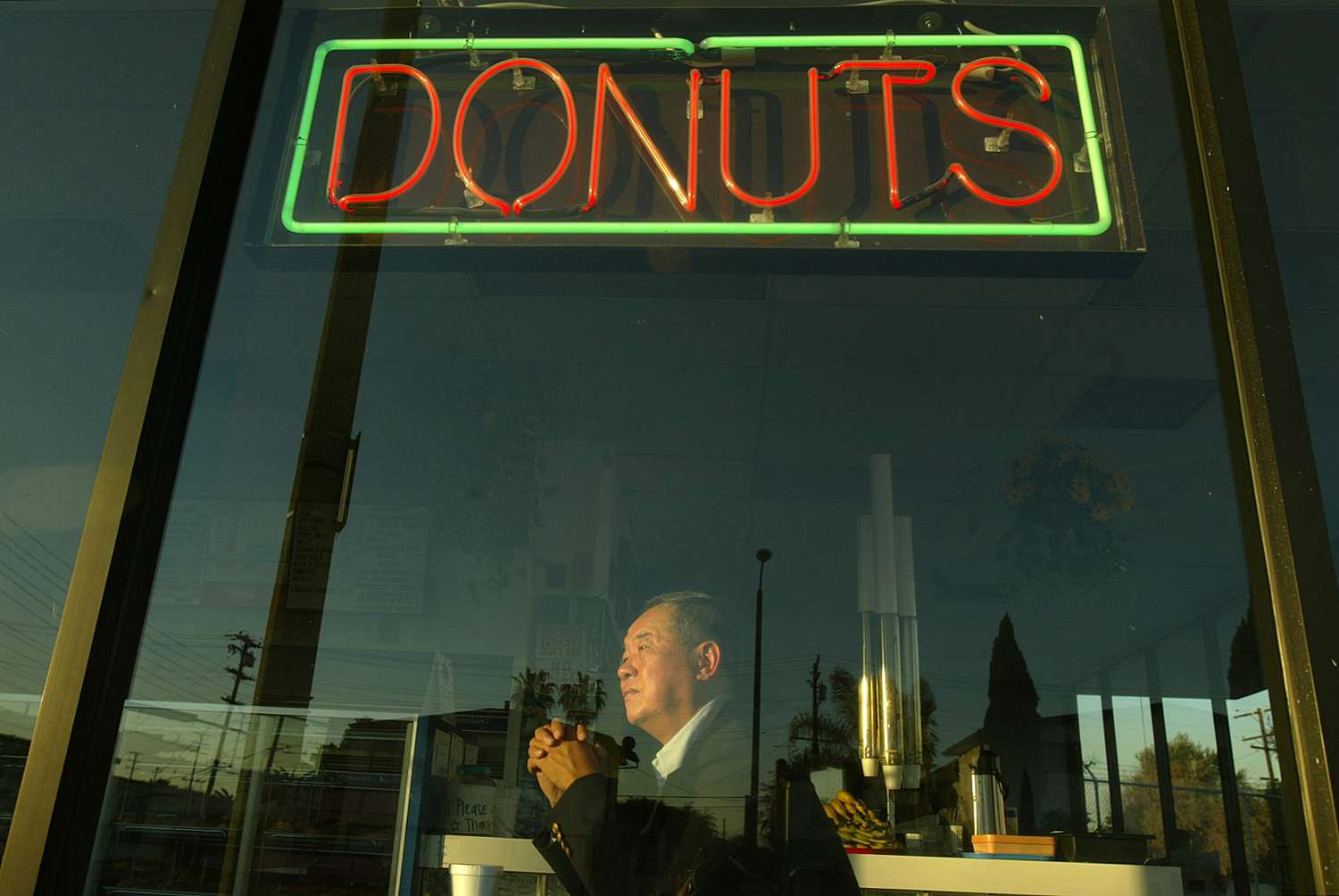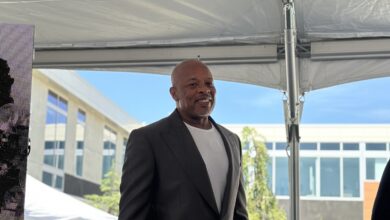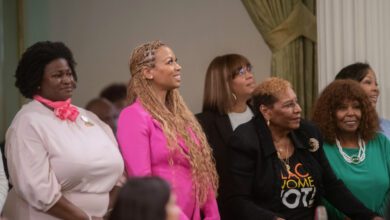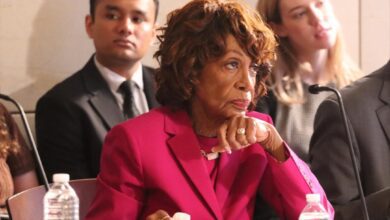How Ted Ngoy Built Southern California’s Doughnut Empire

Los Angeles is a city characterized by its tangle of boundaries, delineating nothing. Guelaguetza, the James Beard Award-winning Oaxacan restaurant founded by Fernando Lopez and Maria Monterrubio, sits squarely within Koreatown. In South L.A., some of the city’s best Southern fried chicken is helmed by Cambodian immigrants at the Louisiana Famous Fried Chicken chain.
And then there’s the fact that Southern California’s doughnut shops are significantly Cambodian-owned. There are, California Sunday Magazine estimates, over 1,500 stores run by Cambodian refugees or their children. Over the past five decades, greater L.A.’s Cambodian community has come to elevate a quintessentially American pastry — in the process, making it more American, in this nation defined by immigrants. The story of the Cambodian-owned doughnut shop is, in many ways, the story of America.
And it all starts with one man, Ted Ngoy. You know those pink doughnut boxes? Well, he started that trend. The whole tale is a novel in itself — well, an autobiography. In 2018, Ngoy’s released his memoir, The Donut King: The Rags to Riches Story of a Poor Immigrant Who Changed the World, chronicling the highs and lows.
The story starts with him touching down in San Diego’s Camp Pendleton on a military jet in 1975. Bearing refugee status from Cambodia, he immigrated with his wife and family, penniless. Within a decade, he would be a multimillionaire — an empire built on the high profit margin of doughnuts and coffee.
More significantly for Angelenos, Ngoy would go on to mold the region’s doughnut scene, which was then a highly variable landscape of hit-or-miss mom-and-pop joints. After all, this was before the trendiness of cupcakes and cronuts; before the artisanal Voodoo Donuts and Blue Star Donuts. A lot of family-owned businesses, as endearing as they were, were not necessarily known for having the freshest of doughnuts. To save money, thinly spread staff might fry up batches just twice a day. That left customers choosing between chains like Winchell’s — arguably better than most and highly consistent — or the small guys. Ngoy changed all that with his local chain, Christy’s Donuts, the original name of the first store he bought.
But first things first, back to 1975. The Khmer Rouge’s civil war was at its tail end, but not before devastating the country in which Ngoy grew up. He and his family had moved to a humble but decent home in the suburbs of Orange County, with the help of a sponsoring church. Unsatisfied with the $500 he was bringing home monthly as a church landscaper and custodian, Ngoy asked the church administration for another job.
He soon started working nights at the local Mobil gas station, next door to a doughnut shop. One long and lonely night shift, his coworker asked him if he wanted a doughnut from next door. “I didn’t know what that was,” Ngoy recalls. However, when he tasted it, it was a Proustian revelation: It reminded him of nom kong, the rice flour pastry he grew up with in Cambodia. When his shift ended in the morning, he bought a dozen more.
“Back at the gas station, I began watching the doughnut shop and noticing how busy it got at certain hours,” he writes in his book. “Though the doughnuts themselves were inexpensive, I watched customer after customer march in and come back out with full bags and cups of coffee. When the shop was slow, people lingered inside reading the newspaper or chatting. I began to form an idea.”
He went and asked the ladies at the doughnut shop if he could open up his own one day, if he saved up his money. They recommended he apply for a management position at Winchell’s. The doughnut chain had apparently gotten rid of a handful of managers and was actively looking for candidates for its training program.
Ngoy convinced his church sponsor, Dean Beaumon, to take him to the company’s headquarters nearby and vouch for him. Beaumon was skeptical and kindheartedly discouraged him, but ultimately acquiesced. After some back and forth, Winchell’s decided to take a chance on him. They asked him to start right then and there, that day. “They asked me if I was ready, and I wasn’t. I was so tired, I wanted to sleep,” Ngoy said. “But I said, ‘Yes, I’m ready.'”
By the company’s own admission, he became their first-ever trainee of Southeast Asian origin. Over the next several months, he learned all the aspects of managing a store — far more than just the process of making doughnuts.
“Luck favors the bold,” Ngoy writes in his book, “but only if they’re adequately prepared.”
After about six months of managing his own store, he brought on the help of his wife and family, and let the existing employees on the payroll go. Winchell’s was fine with this arrangement, as long as Ngoy was bringing in profits, which he was. He was great at customer service and an astute businessman. He would often stay up all night baking to ensure the freshest doughnuts — his youngest son would sometimes accompany him to work, falling asleep beside the pastry table, dusted in flour.
After a year, thanks to his family’s help at the shop, he had managed to save up about $20,000: half of his salary. At the prompting of a regular customer who knew of his entrepreneurial ambitions, Ngoy found a donut shop for sale and decided to go check it out. He didn’t think he was ready to buy his own, but then again, he had done a lot of things before he felt ready. And nearly every time, he had ultimately succeeded — albeit with a few mistakes along the way, which were well worth their risk. This time was no different.
He ended up purchasing his own doughnut store for $30,000: $20,000 down and a $10,000 loan. The shop was called Christy’s Donuts, located in La Habra in Orange County. Ngoy noticed that the elderly couple who sold the store only made doughnuts twice a day; as a result, they weren’t terribly fresh. Taking his business intelligence gleaned at Winchell’s, he started making multiple batches daily. And customers noticed.
At the same time, he was careful to adhere to Christy’s original recipes. “That was important because customers had grown used to the donuts at Christy’s,” he writes in his book. “Even if most donut recipes are very similar, small tweaks here and there, like how often the oil in the fryer is changed or how long the dough is left to proof, can account for big changes in flavor. The donut is a simple food made from just a few ingredients. But go to any three donut shops and order the same kind of donut and you’ll begin to understand that they hide a surprising amount of complexity and nuance.”
It’s this respect for nuance that served Ngoy well — along with his personable demeanor and customer service, ebullient even during his 18-hour days. Within a year, he had four stores. Each one was bought with scrupulous savings, enabled by a lean payroll and the labor of his extended family.
By 1980, just five years after landing in the United States, he owned 20 Christy’s Donuts. He would go on to buy tens more, not often changing the original name. Ngoy had little ego in the game; he didn’t care if his doughnut shops were easily identifiable as his. He didn’t want to build a brand. He knew that customers were loyal to their mom-and-pop stores, and he purchased them as seamlessly as possible.
Along the way, he had helped hundreds of Cambodian refugee families lease their own doughnut stores through him, giving them an entrepreneurial pathway in their new country. By the mid-1990s, the Los Angeles Times reports there were 2,400 Cambodian-owned doughnut shops — and Ngoy was almost singularly responsible. For his business impact on the local community, he was acknowledged by figures like George H.W. Bush, for whom he held political fundraisers and whose inauguration he was invited to attend.
Like any good story, however, the third act looms. By the early 1990s, Ngoy had fallen victim to a gambling addiction, squandering away stores and getting riddled in debt. Later on, he sold what stores were left and moved back to Cambodia, crediting his permanent recovery to his conversion to Christianity.
Today he is heavily involved in the country’s political scene, at one point having worked closely with Cambodian Prime Minister Hun Sen. He also has made back a good deal of his fortune brokering deals with Chinese corporations. “There are certain moments in my life that feel fated,” Ngoy writes towards the end of his book. “My memory of these moments is a memory of being guided by forces larger than myself to take extraordinary leaps.”
As compelling as this tale of doughnuts is, it’s a reductive angle with which to view Ngoy’s poetic autobiography. The book spans his childhood in Cambodia, the tender romance with his first wife, his financial downfall, and his redemption in the country he once fled. Though Ngoy has since bowed out of his American doughnut empire, his legacy remains. Over 1,500 stores in Southern California are run by Cambodian immigrants, and, more importantly, the conviction that anything is possible in California, that final frontier.




